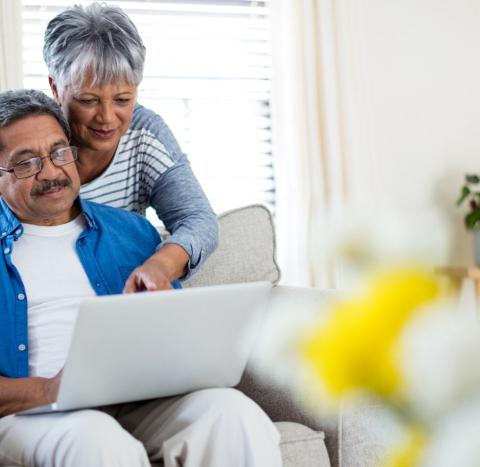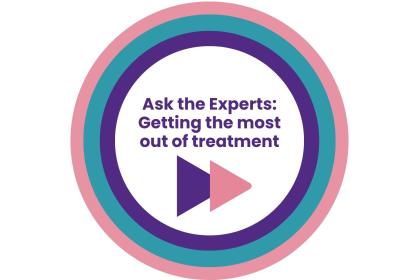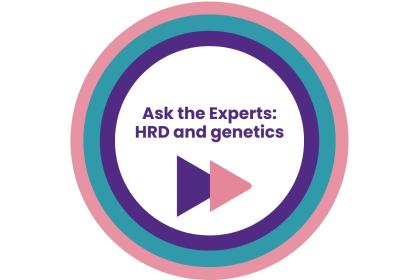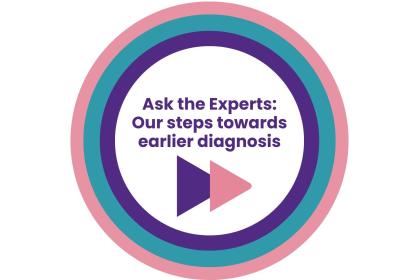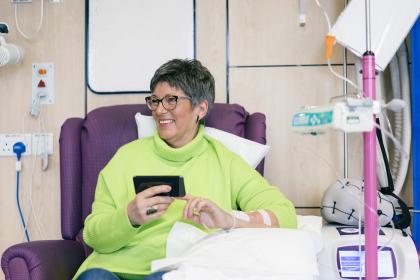We’ve loved seeing so many of you at our recent digital events, but we know that some people can't always make it. Here you can watch back a selection of our digital events that cover key information for those affected by ovarian cancer.
You can also catch up on the latest advice from the experts by watching our full collection of information and wellbeing events back at a time that suits you, in the Ovarian Cancer Community
The Ovarian Cancer Community allows each and every one of us, and those close to us, to share a space where we can hear from the experts, share our experiences, our fears, hopes and tears and also have a wonderful chat and giggle.”
Join the Ovarian Cancer Community
Wellbeing events
- Cognitive Behavioural Therapy (CBT) for menopausal symptoms
Watch back our Cognitive Behavioural Therapy (CBT) for menopausal symptoms session led by Dr Angela Wright (Clinical Sexologist and BMS Accredited Menopause Specialist). Menopausal symptoms can be difficult to manage both physically and psychologically. CBT is a form of therapy, that can be successfully used to help manage the often distressing symptoms of menopause. It can be particularly useful for women who cannot take HRT or those who choose not to. It has been used with a number of long-term health conditions and can be used to manage the challenges associated with menopause and provide women with the tools to cope.
- Make-ovar: skin and nail care
Watch back our Make-ovar: skin and nail care session led by Michelle Kerr (lead volunteer at Look Good Feel Better). We know that treatment for ovarian cancer can bring changes to your body which may impact how you feel about yourself, which can be difficult to deal with. For this event we teamed up with Look Good Feel Better, who share step-by-step skin care advice, nail care guidance, and the opportunity to learn self-care tips; to feel comfortable, confident and more like yourself again.
- Creative writing
Watch back our creative writing sessions led by Angela Daniel (Cancer Support Specialist, Maggie’s Manchester). Living with a diagnosis or supporting a loved one with ovarian cancer can bring up a range of complex feelings that may be difficult to manage and communicate. Creative expression can be an effective way to explore these thoughts, ideas and emotions and help with mental wellbeing as well as easing stress and anxiety. These sessions give the opportunity to practice different writing styles and techniques guided by Angela.
- Movement and mindfulness
This interactive session combines movement and mindfulness to support your wellbeing.
Staying active can help with side effects such as fatigue and improve your emotional wellbeing, an important part of life for everyone affected by ovarian cancer. Claire Brett-Pitt (Level 4 Cancer Rehab Exercise Specialist and qualified British Wheel of Yoga Teacher) and Francesca Jaworska (Level 4 Cancer Rehab Exercise Specialist and Cancer Nurse Specialist) have experience in leading sessions for people with cancer, so are able to guide you safely through this easy-to-follow practical session. Get support on how to get back into gentle movement and try some cardiovascular and strength exercises. You can do it seated or standing – whatever feels right for you.
For many people, ovarian cancer brings uncertainty that can be hard to manage. Mindfulness can improve wellbeing by helping us to focus on the present moment. Claire shares some short and simple mindful approaches and practices that can be used in everyday life, to help manage stress and anxious moments.
- Ovarian cancer and body confidence
Treatment for ovarian cancer will bring changes to your body. We know that these changes may have an impact on how you feel about yourself and can be difficult to deal with. With practical tips from understanding your body shape, finding your optimal colours and building a capsule wardrobe, to personalising your style, this recorded session will help you implement small changes to feel comfortable and confident in your body again. Watch our session led by Gail, Lead Volunteer at Look Good, Feel Better.
- Empower Hour: Sharing your story
This event gave our community the opportunity to raise their voice. We heard from three women living with ovarian cancer, Susannah Oziegbe, Catherine Hunt and Sarah Winmill, about their experiences and the different ways they have each shared their stories through Target Ovarian Cancer.
Whether it’s sharing the symptoms of ovarian cancer, offering tips to members of our online community, or sharing your story in the media and with your local representatives, in this event you can learn more from the team at Target Ovarian Cancer about ways you can get involved in a way that feels right for you. Every voice makes a difference, and we want yours to be heard. Our hope is that you’ll come away from watching this event feeling encouraged and empowered. Together we can amplify your voices and fast forward to earlier diagnosis.
- Diet and nutrition: navigating advice
Our second session with Specialist Oncology Dietitian, Janet Chu provides expert, evidence-based advice on special and restrictive diets, dietary management of common side effects and guidance on healthy eating.
- Ovarian cancer and your finances
Led by Mike David, a Benefits Adviser at Maggie's, this session takes the confusion out of finances. Learn about the different support available so that you can take control of your finances with more confidence.
- Introduction to emotional resilience
Jo Soldan, Clinical Psychologist at Maggie’s Cardiff gives advice on coping emotionally with a diagnosis of ovarian cancer.
- Getting back into exercise
Sally de la Poer, Cancer Rehabilitation Physiotherapist, talks about how to help build your fitness and strength and combat fatigue and leads a short practical session to help you ease back into exercise.
- Mindfulness
Lorrie Cameron, Centre Head of Maggie's Lanarkshire, talks about the benefits of mindfulness and directs you through a few simple mindfulness exercises to help you stay relaxed in the present moment.
- Diet and nutrition
Led by Janet Chu, this session helps take the confusion out of nutritional advice. Janet speaks about the loss of taste, easing digestive discomfort and eating well with a stoma. And shares evidence-based approaches you can use to take care of yourself.
- Relationships and intimacy
Led by Lynn Buckley, Psychosexual Therapist and Clinical Nurse Specialist, this session provides advice and approaches that may help with communication, body image, sex and intimacy during these unusual times.
- Living with fatigue
Led by Mara Sheldon, Occupational Therapist, this online workshop discusses the impact fatigue can have, especially during the pandemic.
- Coping with uncertainty
Led by Dr Shradha Lakhani, Clinical Psychologist, this online seminar focuses on coping with uncertainty for women living with and beyond ovarian cancer.
Information events
- Ask the Experts: genetics and targeted treatments
Treatment of ovarian cancer varies depending on the type, stage and grade of cancer you have. You or your loved one may be offered targeted treatments like PARP inhibitors or bevacizumab. These treatments are used after chemotherapy as a maintenance treatment and work on specific genes and proteins that are involved in the growth and survival of cancer cells. Hear from Dr Rowan Miller about how targeted treatments work, what genetic mutations are and why they make a difference and the impact of genetic mutations on your family members.
- Ask the Experts: managing symptoms and side effects
Managing the symptoms of ovarian cancer and side effects of its treatment can be difficult. Many people find that as treatment continues, they learn more about their side effects and can plan around them. Would you like to know more about chemo fog, neuropathy or lymphoedema? Or maybe you want to help your loved one control their symptoms like fatigue, loss of appetite or shortness of breath. Hear from Dr Louise Hanna and have your questions answered.
- Ask the Experts: HRD and genetics
DNA in our bodies is constantly being damaged and repairing itself. When your body is unable to repair breaks in DNA it’s called homologous recombination deficiency (HRD). If an ovarian tumour tests positive for HRD, it means that the cancer cells have a harder time repairing themselves. Some cancer treatments can help block this repairing process further. Watch this event back to have your questions about HRD and genetics answered by Dr Alexandra Murray, Consultant Clinical Geneticist and Clinical Director at the University Hospital of Wales.
- Ask the Experts: Getting the most out of treatment
Find out how to get the most out of ovarian cancer treatment from our experts: Dr Shibani Nicum (Consultant Medical Oncologist), Dr Dhivya Chandrasekaran (Consultant in Gynaecological Oncology) and Harriet Till (Clinical Nurse Specialist).
Treatment of ovarian cancer will depend on the type, stage and grade of cancer you or your loved one has. We know that understanding how the treatment pathway works can be difficult. Would you like to learn more about who will be looking after you and how treatment decisions are made? Or maybe you’d like to find out more on how to prepare for treatment?
Watch this expert-led session to have your questions answered by our panel of experts from University College London Hospital.
- Ask the Experts: Our steps towards earlier diagnosis
This event focused on the steps we are taking together to drive change and break down barriers to early diagnosis. We teamed up with:
- Dr Charlotte Badescu (GP and woman with a diagnosis) who shared her experiences, the challenges she has identified and how she is standing with Target Ovarian Cancer to make change happen.
- Catherine Pearson (Clinical Change Manager at Target Ovarian Cancer) spoke about our commitment to working together with GPs and healthcare professionals to improve knowledge, training and investment until more women live well with ovarian cancer.
- Ask the Experts: Towards new therapies for low grade serous ovarian cancer
To be able to develop new treatments, researchers and clinicians need to understand the biology for each different type of ovarian cancer. Since low grade serous is less common, less research has been carried out on this type of ovarian cancer. Hear from Professor Charlie Gourley (Clinical Director of the Cancer Research UK Scotland Centre) about the valuable information his recent research project has contributed, and how the findings can hopefully be built on to develop new treatments. Dr Emma Dennett (Target Ovarian Cancer's Research Manager) also shares more about Target Ovarian Cancer’s research programme.
- Ask the Experts: Being Together Wales with Dr Emma Hudson, Dr Aarti Sharma and Sarah Burton
Hear from local experts about newest developments and how they can support you:
- Dr Emma Hudson, Consultant Clinical Oncologist at Velindre Cancer Centre
- Dr Aarti Sharma, Consultant Gynaecological Oncological Surgeon at the University Hospital of Wales
- Sarah Burton, Macmillan Lead Gynae Oncology Clinical Nurse Specialist at the Velindre Cancer Centre
- Ask the Experts: Being Together Scotland with Mr Kevin Burton, Professor Charlie Gourley and Lorraine Chitambo
Hear from local experts about the newest developments and how they can support you:
- Mr Kevin Burton, Consultant Gynaecological Oncologist at Glasgow Royal Infirmary
- Professor Charlie Gourley, Medical Oncologist at Western General Hospital and researcher at University of Edinburgh
- Lorraine Chitambo, Gynae Surgical Oncology Clinical Nurse Specialist at Royal Infirmary Edinburgh
- Ask the Experts with Dr Shibani Nicum
Watch our session with Dr Shibani Nicum, Consultant Medical Oncologist, and Valerie Lang, a specialist nurse on Target Ovarian Cancer’s support line.
Dr Nicum specialises in the treatment of women with ovarian cancer and other gynaecological cancers at the Oxford Cancer Centre. As well as treating women, she is also the Oxford gynae-oncology research lead. Dr Nicum’s particular interests are in BRCA mutated cancers and the development of new personalised therapies.- Ask the Experts with Professor Charlie Gourley
Professor Charlie Gourley, oncologist and ovarian cancer researcher, and Valerie Lang, specialist nurse at Target Ovarian Cancer, answer questions about ovarian cancer treatment, care and research.
Professor Gourley is an oncologist and researcher working in Edinburgh who has led several successful clinical trials into ovarian cancer treatment.


